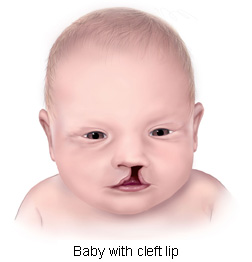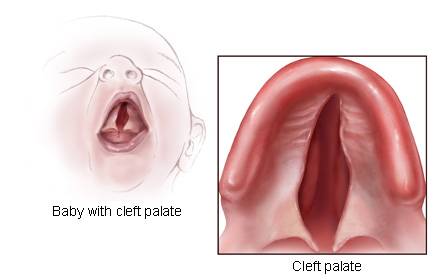What is a cleft lip?
 A
cleft lip is an opening in the upper lip. The lip is formed early in
pregnancy (at about 4-7 weeks of pregnancy). The opening in the lip
can be a small slit in the lip or a large opening that goes through
the lip into the nose. A cleft lip can be on one or both sides of
the lip, or more rarely, can be in the middle. Children with a cleft
lip can also have a cleft palate.
A
cleft lip is an opening in the upper lip. The lip is formed early in
pregnancy (at about 4-7 weeks of pregnancy). The opening in the lip
can be a small slit in the lip or a large opening that goes through
the lip into the nose. A cleft lip can be on one or both sides of
the lip, or more rarely, can be in the middle. Children with a cleft
lip can also have a cleft palate.
Surgery to repair the cleft lip is usually done in the first few
months of life, although more surgeries are sometimes needed later
in life.
What is a cleft palate?
A cleft palate is an opening in the roof of the mouth, called the
palate. The palate is formed early in pregnancy (at about 6-9 weeks
of pregnancy). A cleft palate can occur when the two sides of the
palate do not come together correctly. In some children, both the
hard (front) and soft (back) parts of the palate are open. In other
children, only part of the palate is open.
Surgery to repair a cleft palate is usually done in the first year
of life, although more surgeries are sometimes needed later in life.

What causes cleft lip or cleft palate?
We do not know what causes cleft lip or cleft palate in most
infants. Some children have a cleft lip or cleft palate because of
changes in their genes. Genes are passed from parent to child in the
egg and sperm. Genes give the body instructions for how to grow.
Cleft lip and cleft palate are thought to be caused by a combination
of genes and other factors. Smoking during pregnancy is one factor
that increases the chance of having a baby with a cleft lip or cleft
palate. Certain medications, changes in nutrition, and other factors
also may increase the chance of having a baby with a cleft lip or
cleft palate.
Can cleft lip and cleft palate be prevented?
There is still a lot we
don’t know about how to prevent cleft lip, cleft palate, and many
other birth defects. But we do know that women who smoke during
pregnancy are more likely to have a baby with a cleft lip or palate
than women who do not.
Click here for
Healthy Pregnancy tips.
What problems do children with cleft lip or cleft palate have?
Children with cleft lip or cleft palate often have problems with
feeding and speech. Other problems can include many ear infections,
hearing loss, and problems with their teeth.
Resources for families and individuals affected by cleft lip or
cleft palate
Cleft Palate Foundation
MedlinePlus
American Academy of Family Physicians
Date:
November 13, 2007
Content source: National Center on Birth Defects and Developmental
Disabilities